| |
Bertram
Turetzky : Unsung Thaumaturgist of the Contrabass
by Derek Taylor
September 2000
Judged beside other instruments the contrabass is something of a late
bloomer—its place as a viable solo improvising voice being only
a relatively recent innovation. Bertram Turetzky is one of the persons
chiefly responsible for its shift in stature during the 20th century.
But unlike other forerunners on the instrument such as Blanton, Pettiford
and Mingus, Turetzky's name is not widely known or touted. One reason
behind the man's comparative anonymity in the public consciousness
is perhaps centered in his decision to use academia as his base of
operations. A member of the University of California, San Diego faculty
he's made his presence felt more often as an educator than as a performer.
Residency in the scholastic sphere has allowed him the freedom and
security to concentrate on uncovering the full spectrum of possibilities
achievable through the instrument, as well as to write and contribute
to books on the subject including the seminal The Contemporary
Contrabass, first published in 1974. In addition to his literary
efforts he's labored diligently to foster a steady stream of students,
many of whom have benefited immeasurably under his expert tutelage.
Fortunately all of this activity has not come at the cost of his documenting
his work in audio form. He has also somehow found the time to record
over 35 albums since the mid-1960s, beginning with 1964's Contrabassist,
on labels such as Nonesuch, Music & Arts, Incus, Vanguard, New World,
CRI and most prolifically, Nine Winds. In conjunction with these efforts
more than 300 compositions have been written for and performed by
Turetzky over the course of his career. His music is a complex amalgam
of diverse and often disparate sources including Modern Classical,
free improvisation, jazz, folk, and the music of other cultures. In
the company of like-minded musicians and artists his compositions
take on almost empyrean airs blending a virtuosic command of all structural
aspects of his bass from strings to body with an earthy integrity
that is never overly intellectual despite the obvious breadth of the
intellect behind it. While much of his back catalog is currently difficult
to come by, his work for Nine Winds as well as recordings on Music
& Arts and Incus are still easily available. Reams of paper could
be consumed by observations on these titles, but for the sake of brevity
and readability this article seeks only to highlight a handful of
the sonic wonders each contains and leave it to the listener to delve
deeper.
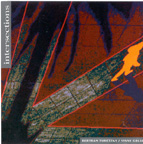 The
interplay between Turetzky and Vinny Golia is frequently at the core
of the bassist's sessions for Nine Winds and it's no coincidence that
the two men appear together in every instance. Intersections
(Nine Winds) is the earlier of their duo collaborations on the label,
but even though it precedes 11 Reasons to Begin temporally,
it is every bit an equal in terms of the telepathic synergy these
two players share. Several of the pieces are composed for more than
two instruments making the presence of overdubbing a necessity. Such
studio tinkerings are never intrusive to the flow of the music however
and simply adds further texture and dynamics in every instance in
which they are employed. The
interplay between Turetzky and Vinny Golia is frequently at the core
of the bassist's sessions for Nine Winds and it's no coincidence that
the two men appear together in every instance. Intersections
(Nine Winds) is the earlier of their duo collaborations on the label,
but even though it precedes 11 Reasons to Begin temporally,
it is every bit an equal in terms of the telepathic synergy these
two players share. Several of the pieces are composed for more than
two instruments making the presence of overdubbing a necessity. Such
studio tinkerings are never intrusive to the flow of the music however
and simply adds further texture and dynamics in every instance in
which they are employed.
Opening with a shakuhachi/bass invocation Golia's sharp wind gusts
swirl above Turtezky's wiry arco underpinning. Gurgling contrabass
clarinet and whistling bow on resinous strings duck and dance on the
second track. For the third jousting piccolos spar and are punctuated
by Turtezky's pointed bow slices and muted harmonics.
One of the most striking aspects of this date is the way in which
the players make use of a continuum of sonorities ranging from deep
bass drones to flittering upper register flurries. Racing effortlessly
from blurred pizzicato to sparely skipped bow, Turetzky's fingers
map out a terrain ideally suited for Golia's dramaturgic reeds and
winds to soar across. In the process, rather than playing up their
places as virtuosi, they toss out all pretenses and set about simply
enjoying one another's company. The marvelous artistry that results
is just the joyous by-product of their amicable conversations.
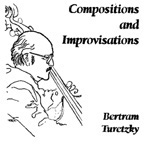 Reflecting
on Turetzky's importance to the present state of the contrabass in
modern music the liner notes that accompany Compositions &
Improvisations (Nine Winds) may be difficult to believe. According
to N.L. Corey who authors them this release marks the first instance
in which "Turetzky is featured as a composer and improviser, and not
just as a performer presenting composer authorized recordings of music
written for or dedicated to him." Even among the small number of recordings
covered in this article, 1986's Intersections, which prominently
features pieces penned and improvised by the bassist, seems to directly
refute this claim. But these inconsistencies have no reflection on
the music and Turetzky's eloquent touch invests each of the compositions
showcased here with an immediately discernable beauty. Reflecting
on Turetzky's importance to the present state of the contrabass in
modern music the liner notes that accompany Compositions &
Improvisations (Nine Winds) may be difficult to believe. According
to N.L. Corey who authors them this release marks the first instance
in which "Turetzky is featured as a composer and improviser, and not
just as a performer presenting composer authorized recordings of music
written for or dedicated to him." Even among the small number of recordings
covered in this article, 1986's Intersections, which prominently
features pieces penned and improvised by the bassist, seems to directly
refute this claim. But these inconsistencies have no reflection on
the music and Turetzky's eloquent touch invests each of the compositions
showcased here with an immediately discernable beauty.
Opening with the austere "Reflections on Ives & Whittier" Turetzky
spreads a calming sheen of tone colors that cleanses the aural palette
and prepares the ears for the program to come. "Neruda", dedicated
to the poet Pablo, is a nest of acerbic words and stringent bowing
bookended by melancholy pizzicato tugs. However, Jerome Rothenberg's
inflated vocal delivery ends up sounding somewhat overdone. The poetry
of Sherley Anne Williams, featured on three tracks starting with "Big
Red and His Brother", is much more effective. Reminiscing on Malcolm
X, but referencing his earlier street moniker, Williams' piece positively
oozes soul and Turetzky responds in kind—tugging out reverberating
plucks that answer her self-assured verses. "One-Sided Bed Blues"
hits a similar groove touching slyly on that lonesome condition we've
all found ourselves in at one time or another.
Turetzky takes the "Poems, Portraits, Ballades and Blues" suite predominantly
solo and uses its subsections to paint a comprehensive picture of
the contrabass in all its variegated sonic guises. Rothenberg slips
in on the opening "Numerology", the woe-laden "Lament" and the loquacious
"Mingus" before injecting a near lethal dose of Dadaism into the "Four
Settings from 'That Dada Strain'" that threatens to tip the series
over. Fortunately Turetzky's improvisations act as an effective cantilever
and keep things righted. The absentee Golia finally makes the scene
on "Shazam" tying off melodic knots on Turetzky's brazenly bowed lines
before carrying through to the other nod to Chazz, "I Remember Mingus".
On this final piece, which rounds out the program, the bassist pays
respects with the aid of a small ensemble echoing distant strains
from "Yes, Jesus Loves Me" as Quincy Troupe reads wryly from his poem.
Attended to in a single sitting this collection offers a piebald bag
of pieces, some more satisfying than others. But like Turetzky's other
poetry/music amalgam Tenors, Echoes and Wolves the results
are well worth hearing.
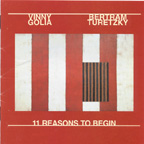 Golia
and Turetzky are like two sides of the same polished coin. Their rapport
is so complete that even when they are parsed down to two voicings,
reed and bass, their creations far outdistance the dynamic limitations
of their sparse instrumentation. The opening "2 and 1" on 11 Reasons
To Begin (Music & Arts) is a consummate example. Golia's ethereal
flute intones over a bowed counterpoint that just creeps in within
audible range. Turetzky shifts to supple plucks radiating a soothing
pattern of notes sandwiched by skipping bow streaks that perfectly
compliment his partner's airy phrases. Pattering percussive knocks,
presumably generated from the wooden body of Turetzky's bass, punctuate
before another gorgeously rendered pizzicato interlude. "Dialogue"
weds almost oriental string shapes with what sounds like a harmonium.
The cyclic "Triologue" weaves recurring feathery flute figures that
sound like the calls of nesting owls and reference Eastern and Native
American influences with Turetzky's throbbing interjections. Later
in the piece, and throughout the disc for that matter, Golia opens
up his satchel of instruments further making stunning use of other
flute and double-reed variants as well as delegates from the clarinet
family ("How Many Sunsets"), but with saxophones strangely absent.
In each case he always seems to find the perfect match sonically with
Turetzky's Stygian string sculptures. His solo exposition on "Music
for Bass Clarinet" starts Dolphyian in design, but quickly ascends
further in a miraculous wave of gorgeously split tones. Golia
and Turetzky are like two sides of the same polished coin. Their rapport
is so complete that even when they are parsed down to two voicings,
reed and bass, their creations far outdistance the dynamic limitations
of their sparse instrumentation. The opening "2 and 1" on 11 Reasons
To Begin (Music & Arts) is a consummate example. Golia's ethereal
flute intones over a bowed counterpoint that just creeps in within
audible range. Turetzky shifts to supple plucks radiating a soothing
pattern of notes sandwiched by skipping bow streaks that perfectly
compliment his partner's airy phrases. Pattering percussive knocks,
presumably generated from the wooden body of Turetzky's bass, punctuate
before another gorgeously rendered pizzicato interlude. "Dialogue"
weds almost oriental string shapes with what sounds like a harmonium.
The cyclic "Triologue" weaves recurring feathery flute figures that
sound like the calls of nesting owls and reference Eastern and Native
American influences with Turetzky's throbbing interjections. Later
in the piece, and throughout the disc for that matter, Golia opens
up his satchel of instruments further making stunning use of other
flute and double-reed variants as well as delegates from the clarinet
family ("How Many Sunsets"), but with saxophones strangely absent.
In each case he always seems to find the perfect match sonically with
Turetzky's Stygian string sculptures. His solo exposition on "Music
for Bass Clarinet" starts Dolphyian in design, but quickly ascends
further in a miraculous wave of gorgeously split tones.
The distillation of Golia's instrumentation into the designation of
'woodwinds' and 'aerophones' in the liners is one of the few frustrating
aspects of the disc leaving the untrained ear straining to figure
out just what he's playing from piece to piece. Turetzky's stolid
adherence to his contrabass avoids such problems; though he still
succeeds in making his strings mimic a myriad of sonorities beyond
those expected. A beautiful instance of his unbelievable acumen arises
on the solo "Songs for R.E." where he manipulates the taut elasticity
of his strings to shape an improvisation draped in incredibly intricate
emotive subtlety. Together these eleven duets bend and ultimately
shatter the expectations of such a setting, matching meditative chamber-like
delicacy with an arresting firmness of tandem execution.
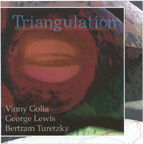 Golia
and Turetzky have favored a readily discernable pattern in the majority
of their recordings together over the past decade. The pair teaming
up with a third improvising voice characterizes this pattern, as on
Triangulation (Nine Winds). Curiously, in every instance to
date the third party has never been a second reed player. When one
examines Golia's reed palette it's easy to see why—the man incorporates
just about every representative of that particular instrument family
tree on a regular basis. Golia
and Turetzky have favored a readily discernable pattern in the majority
of their recordings together over the past decade. The pair teaming
up with a third improvising voice characterizes this pattern, as on
Triangulation (Nine Winds). Curiously, in every instance to
date the third party has never been a second reed player. When one
examines Golia's reed palette it's easy to see why—the man incorporates
just about every representative of that particular instrument family
tree on a regular basis.
This time out Golia commonly restricts himself to the extreme register
ends of his instrumental continuum though the overall focus is most
often centered on the bass sonorities. George Lewis beautifully occupies
the guest chair. "Triangulations & Inferences" wallows in the subterranean
register wedding contrabass clarinet, contrabass and trombone with
frequent spaces of eructative overblowing and bowing. Spidery string
patterns, gurgling brass and scribbling clarinet vie for prominence
on "Bu-Dun" and on the ominously titled "Simultaneous Disturbances"
Golia uncaps the mouthpiece on his unwieldy bass saxophone and blows
Gordian melodic knots in unison with Lewis' slippery slurs. Turetzky,
somewhat muddied in the mix, spreads exfoliating bowed swathes beneath.
The two duet pieces on the program allow Lewis an opportunity to interact
with Golia and Turetzky individually to stunning effect. Turetzky's
mercurial bow delivers precognitive counterpoint on "Duet for Trombone
& Contrabass" and Golia's whisper-thin toned sopranino contrasts luminously
with Lewis' acrobatic melodicism during the second dialogue. Rounding
things out, elephantine contra-bass clarinet, murky bass and garrulous
trombone meet on the final "Gianormous". Once again Turetzky and Golia
are able to incorporate a third unique voice into their ironclad rapport
and create a series of pieces rich both in creative density and mystery.
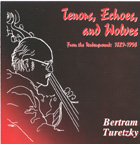 Tenors,
Echoes And Wolves (From The Underground) is a compendium of performances
highlighting what Turetzky calls his "twin artistic passions—improvisations
and the fusion of poetry of music", this disc is a varicolored tapestry
of sounds both spoken and played. Across the sixteen pieces contained
on the disc Turetzky melds his instrument to a diverse array of texts
that mirror the emotions ensconced by his strings. Scott Walton's
vocalizations bring the words to life working a malleable verbal cadence
around Turetzky's improvisations. On pieces such as "Cantolobosolo",
a protracted reflection on those souls possessed with the artistic
imperative to rebel against the manacles of conformity, verbiage sometimes
outweighs the impact of the music. But when Turetzky is at the center
his bass takes on a hypnotizing girth and substance. "Beethoven Variations",
constructed from material from the maestro's 5th Symphony adds trumpet,
cello, clarinet and flute to the adhesive anchor of bass and creates
a shifting soundscape pockmarked by eerie silences. Tenors,
Echoes And Wolves (From The Underground) is a compendium of performances
highlighting what Turetzky calls his "twin artistic passions—improvisations
and the fusion of poetry of music", this disc is a varicolored tapestry
of sounds both spoken and played. Across the sixteen pieces contained
on the disc Turetzky melds his instrument to a diverse array of texts
that mirror the emotions ensconced by his strings. Scott Walton's
vocalizations bring the words to life working a malleable verbal cadence
around Turetzky's improvisations. On pieces such as "Cantolobosolo",
a protracted reflection on those souls possessed with the artistic
imperative to rebel against the manacles of conformity, verbiage sometimes
outweighs the impact of the music. But when Turetzky is at the center
his bass takes on a hypnotizing girth and substance. "Beethoven Variations",
constructed from material from the maestro's 5th Symphony adds trumpet,
cello, clarinet and flute to the adhesive anchor of bass and creates
a shifting soundscape pockmarked by eerie silences.
Walton returns for the next handful of tracks shouting a consonantal
rush on "London Onion" above percolating bowed strings before conjuring
the Beat spirits on a series of homages to jazz tenor saxophonists.
During the latter series Turetzky picks out bulbous pizzicato figures
that perfectly evoke a smoky stage in some afterhours joint and buoy
Walton's phrasings on a frothy crest of blue notes. On "Listening
to Lester Young" plangent bow bleeds sorrowful strains from strings
referencing the sadness endemic of Lester's later years. The pieces
for Trane and Newk are similarly well suited.
"Orbs I & II" are duet pieces for bass and clarinet and enlist the
aid of Anthony Burr to fill the latter role. In each instance the
pair spins an absorbing web of complimentary lines often overlapping
the sonorities of their instruments to the point that they are almost
indistinguishable. Walton reenters for "6 Haiku Settings" and "Deadbelly"
sharing the sonic stage with Turetzky's miniature abstractions. On
the latter piece a throbbing viscosity settles over Turetzky's handcrafted
string drawls in a down home eulogy to the complex relationship between
Leadbelly and Folkways Records' Mose Asch. Gathered together these
pieces coalesce into a motley program and while the words don't always
match the music Turetzky's goal of successfully welding poetry to
his own improvisations is largely attained.
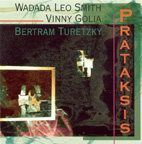 Wadada
Leo Smith is in many ways a perfect compliment to the well-established
team of Turetzky and Golia. His career has followed a similar all-encompassing
course in which an incredibly diverse array of music has been siphoned
into his creative reservoir. Modern Classical composition, ethnic
folk themes, myriad jazz styles and the perplexities of free improvisation
are all part of his signature approach to brass. With these commonalities
factored into the equation for success it's no wonder that Prataksis
(Nine Winds) works as well as it does. Wadada
Leo Smith is in many ways a perfect compliment to the well-established
team of Turetzky and Golia. His career has followed a similar all-encompassing
course in which an incredibly diverse array of music has been siphoned
into his creative reservoir. Modern Classical composition, ethnic
folk themes, myriad jazz styles and the perplexities of free improvisation
are all part of his signature approach to brass. With these commonalities
factored into the equation for success it's no wonder that Prataksis
(Nine Winds) works as well as it does.
Smith's elegiac trumpet announces the trio's arrival trailed by Golia's
stuttering sonar soprano and Turetzky's whisper thin bow accents.
With "Dancing on the Edge" pinched brass and suspirating bass clarinet
converse across a pattering percussive backdrop of bouncing bow on
bass body and strings. Turetzky's scribble patterns deployed in counterpoint
to Smith's bleating bell on the staccato "Alexandra's Fancy" are another
cause for unqualified awe. All three men unveil an unexpected lyrical
turn on the follow-up "Music For Confused Travelers", stitching demulcent
flute into an austere canvas of earthen arco tones and solemn brass
phrases. Similarly the richly rendered "Of Love and Loss" finds Turetzky
wringing an atrabilious improvisation from his instrument that beautifully
blends muscular delivery with deeply conveyed sadness.
Golia dusts off his rarely heard tenor for "Growing to Be Shadows"
mixing it up with Smith, both muted and clean as Turetzky fills in
the rhythmic blanks with obliquely bowed accompaniment. The bassist
drops out on the tellingly titled "Two Up, Two Down" allowing Smith
and Golia to match wits alone. Their intimacy is short-lived however
as Turetzky returns for the closing "Fractured Laws" where he once
again demonstrates his unerring command of his bass as percussive
instrument and the three move across a disarming topography of drone
patterns. A beguiling journey from onset to end this disc blurs the
lines between improvisation and composition demonstrating that when
applied to music of this caliber such lexical distinctions become
exceedingly difficult to discern.
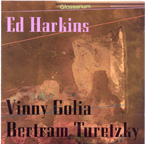 Ed
Harkins is not only a musical colleague of Turetzky, he is also an
academic one—both men hold professorial posts on the UCSD faculty.
Their professional as well as physical proximity to one another allows
for fluid exchange of musical ideas and plenty of time to practice
together. On Glossarium (Nine Winds), Golia again joins the
fold creating another unique trio setting of wind/reeds, brass and
contrabass. Ed
Harkins is not only a musical colleague of Turetzky, he is also an
academic one—both men hold professorial posts on the UCSD faculty.
Their professional as well as physical proximity to one another allows
for fluid exchange of musical ideas and plenty of time to practice
together. On Glossarium (Nine Winds), Golia again joins the
fold creating another unique trio setting of wind/reeds, brass and
contrabass.
Through his skidding bow swathes on "For Now…" Turetzky generates
a whirling pulse beneath Harkins' hyperactive sputters and Golia's
cheek-puckering bass clarinet. Over much of the program Harkins makes
ingenious use of breath sounds and mouthpiece manipulations expanding
exponentially on the verbal referent of the disc's title. There are
times where these experiments veer too sharply into introspection
and tax the patience, but fortunately there are many more of interest
to offset them. Throughout "Commencement" Harkins blurts out bullfrog-like
croaks as Golia and Turetzky engage in more agitated banter. "Air"
is an extended exercise in rarified breath sounds making ample use
of silence along with hushed, percussive eddies channeled through
instrument orifices. On "Dyads" Golia and Harkins aim at perplexing
the listener and succeed in doing so through a careful weaving of
lines. Early in the piece it becomes obvious that there are more than
two instruments operating on the sound canvas, but deciphering whether
it's a case of overdubbing or multiple instruments blown simultaneously
and shifted in space requires vigilant listener concentration and
is still in the end open to debate. A similar confounding case surfaces
on "Could the Future Be Marco?", where Harkins plays a duet with himself
muted and straight. His sustained vocalized drones take on the timbre
of Tuvan throat singing on "Chant" shearing through a shroud of subsonic
bowed bass and groaning bassoon.
Compared to other discs covered in this survey Turetzky's contributions
here are somewhat less prominent. His bass is frequently a background
voice leaving the foreground to Golia and Harkins. But even in this
sometime supportive and understated role his gargantuan technique
shines through and there are tracks such as "A Compass From Dennis"
and "Top Forty" where his strings occupy space prominently in the
forefront.
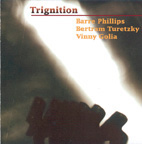 Matching
chops with Turetzky is a feat few if any bassists could accomplish.
But among the small number of players physically and psychologically
up to the challenge Barre Phillips has to be at the front. Like Turetzky,
he's rarely been one to thrust his work out in plain view and locating
the scattered fruits of his variegated discography takes some work.
In similar fashion his command of the contrabass is on par with the
modern elite of the instrument. The chance for these two doyens to
twine strings may have taken some time to materialize, but the results
recorded on Trignition (Nine Winds) more than substantiate
the worth of the wait. Matching
chops with Turetzky is a feat few if any bassists could accomplish.
But among the small number of players physically and psychologically
up to the challenge Barre Phillips has to be at the front. Like Turetzky,
he's rarely been one to thrust his work out in plain view and locating
the scattered fruits of his variegated discography takes some work.
In similar fashion his command of the contrabass is on par with the
modern elite of the instrument. The chance for these two doyens to
twine strings may have taken some time to materialize, but the results
recorded on Trignition (Nine Winds) more than substantiate
the worth of the wait.
Throughout the lengthy program, which clocks in at nearly eighty minutes,
Golia's reed repository acts both as guiding melodic light and colorful
shading implement amongst the verdant and tangled string foliage sprouted
by his partners. Phillips and Turetzky continually prove themselves
consummate masters of pitch tectonics shaving an unbelievable range
of harmonic textures that somehow blend into a lattice-like whole.
Beginning with "The Incomplete Touching of the Ground" each man alternates
between bow and fingers, coaxing commensurate shapes that interlock
like pieces of an intricately crafted Chinese puzzle box. Golia sifts
deftly through his instruments always seeming to find the right reed
for the job. His work in the upper registers, as on the frolicsome
"Dale of the Merry Years", offers fascinating compliment to his colleagues'
darker harmonic lines. Other pieces such as "Confirmation of Judgment"
and "It Was Probably the Last One to Be Named" find him excavating
heatedly in the bass register by way of baritone sax and contrabass
clarinet, surrounded by prickly bow skips and staccato string slaps.
In both types of settings the level of precision interplay borders
on the supernatural.
Attending to the multiplicity of extended string techniques on hand
is an exhausting enterprise, but one filled with innumerable rewards.
Aspiring bassists bearing witness to these sounds are likely to come
away disillusioned by the progress of their own prowess. At the same
time however, Phillips and Turetzky's improvisations demonstrate conclusively
that when the right ten digits are paired with four strings the number
of sonic variations achievable becomes limitless.
|
|
|
|
|

